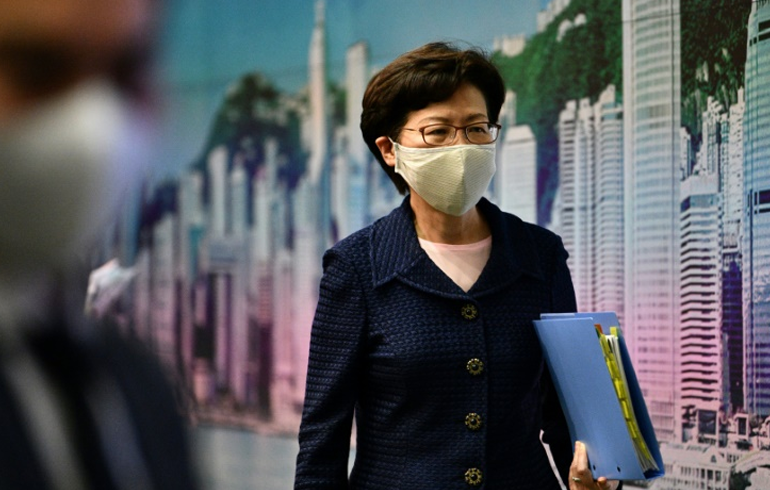The US Treasury has imposed sanctions on Hong Kong chief executive Carrie Lam, and 10 other top officials from Hong Kong and mainland China.
The sanctions were used to target those undermining Hong Kong’s autonomy, said Treasury Secretary Steven Mnuchin.
“The United States stands with the people of Hong Kong,” Mr Mnuchin added.
The move comes weeks after China imposed a controversial national security law on Hong Kong, which critics say threatened its freedoms.
US-China tensions continue to escalate – only a few hours ago, the Trump administration moved to ban US transactions with the Chinese owners of the WeChat and TikTok apps..
Among those sanctioned are Hong Kong’s police commissioner and several political secretaries.
The US Treasury directly accused Ms Lam of “implementing Beijing’s policies of suppression of freedom and democratic processes”.
“In 2019, Lam pushed for an update to Hong Kong’s extradition arrangements to allow for extradition to the mainland, setting off a series of massive opposition demonstrations in Hong Kong,” the US Treasury added in a statement.
The US has strongly criticised Hong Kong’s national security law, with US Secretary of State Mike Pompeo calling it an “Orwellian move” and an assault “on the rights and freedoms of the people of Hong Kong”.
Announcing the sanctions on Friday, Mr Pompeo said: “The Chinese Communist Party has made clear that Hong Kong will never again enjoy the high degree of autonomy that Beijing itself promised to the Hong Kong people and the United Kingdom for 50 years.
“President Trump has made clear that the United States will therefore treat Hong Kong as ‘one country, one system’ and take action against individuals who have crushed the Hong Kong people’s freedoms.”
The 11 sanctioned officials will have all property in the US seized and financial assets frozen.
Ms Lam has previously scoffed at the suggestion of sanctions, saying last month: “I do not have any assets in the United States nor do I long for moving to the United States.”
She told reporters she would “just laugh it off” if the US sanctioned her.
The latest sanctions were authorised by an executive order Mr Trump signed in July aimed at punished China for its role in Hong Kong’s affairs.
What else has happened with US-China relations?
Tensions between the US and China have risen at an accelerated pace in recent months.
The White House has accused China of lying about the origins of the coronavirus which emerged from China late last year, of using social media apps to spy on Americans, of “stealing” intellectual property and of hiding a wanted criminal within a Chinese embassy in the US – to name only a few allegations.
Both countries ordered each other’s embassies in major cities to close last month as tensions rose.
The US has also been pushing to have China’s Huawei 5G telecoms systems banned by its Five Eyes allies – Australia, Canada, New Zealand and the UK.
China has expelled journalists from major US newspapers after the US placed new restrictions on Chinese media outlets in the US that are affiliated with the country’s communist government.
Earlier this month China issued arrest warrants for six pro-democracy activists, including an American citizen.
Source: BBC




















































